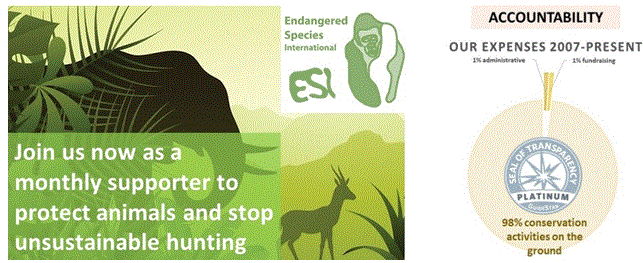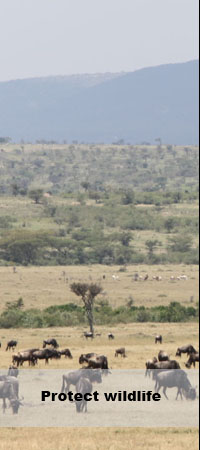|
“There is a tropical forest extinction crisis. The crisis is, however, largely unseen. The world’s tropical forests are losing their fauna as wildlife populations become depleted and species are lost through overexploitation. Only 2% of the mammals threatened by hunting have populations considered stable or increasing. The situation is critical in many parts of the world.” ESI Founding Director Pierre Fidenci
Hunting is an insidious but significant driver of tropical forest defaunation, risking cascading changes in forest plant and animal composition. Ineffective legislation and enforcement along with a failure of decision makers to address the threats of hunting is fanning the fire of a tropical forest extinction crisis. If tropical forest ecosystems are to survive, the threat of unsustainable hunting must be adequately addressed now. Hunting for bush meat and habitat loss have led to the decline of thousands of animal species including seven primate species.
The average rate of vertebrate species loss is now up to 1,000 times higher than background rates. Population sizes of vertebrate species have been declining, mainly due to the twin threats of direct exploitation and habitat destruction. Unsustainable hunting for consumption and trade of wild meat (also known as bush meat) by humans represents a significant extinction threat to wild terrestrial mammal populations, perhaps most notably in parts of Asia, Africa and South America. Countries with the most endemic species threatened by hunting include Madagascar, Indonesia, Philippines, Brazil, Papua New Guinea, India and China.
While many ethnic groups have hunted wildlife for subsistence over millennia, often with highly detrimental effects, the unsustainability of this practice has accelerated in many areas due to growing human populations, an increasing tendency for wild meat to be traded commercially, and the widespread adoption of firearms and motorized transport that increase the efficiency of hunting. Larger species are typically targeted by bush meat hunters first and are also the least able to bear hunting off takes. As wildlife populations outside protected areas decline, poaching pressure is increasing in many parks and reserves. As a consequence, many forests, savannahs, grasslands and deserts in the developing world are now becoming empty landscapes devoid of harvest-sensitive wild mammals.
ESI work to protect animals
Enforcement of existing legal wildlife protection or improvement of legal instruments has a key role to play in reducing excessive harvests of wildlife in many contexts. Endangered Species International (ESI) supports all field work involving enforcement of existing wildlife laws. It also means adequate budget to support forest patrols and local communities to develop attracting livelihood alternatives.
ESI fosters good management practices for the mitigation of defaunation in tropical forests. These include the effective management of large protected areas where hunting and human incursion are negligible; control of hunters and wildlife carriage along transportation infrastructure, especially rivers and roads.
It is critical that governments immediately establish and enforce species protections, bycatch mitigation programs, marine protected areas, and international trade controls. Educational initiatives focused on the issues, and safe-release protocols for animals captured incidentally are also urgently needed at the local level to effectively implement protections.
Historically, many cultures from around the world obtained the vast majority of protein calories from plants and not animals—either wild or domestic. Consumption of high-protein plant foods such as soy, pulses, cereals and tubers can satisfy protein requirements that are associated with fewer environmental impacts than livestock or wild meat, while yielding significant human health benefits. In some areas, using traditionally grown protein-rich plant foods rather than wild meat as a primary protein source for humans could help mitigate the wildlife crisis if cropland is available or plant-based food products can be imported at the regional scale. An important solution to the unsustainable hunting practices is to shift diet to a grown protein-rich plant food. ESI fosters ground initiatives in that direction.
Become a monthly supporter to protect wildlife and habitats
Our planet now faces a global extinction crisis never witnessed by humankind. Take action to help us fight it and protect wilderness where it is urgently needed. Your continued support is vital to protect imperiled wildlife and wild places. A monthly donation can achieve amazing protection for animals and nature. Our critical work could not occur without your generous donations. Donate monthly now!

Related Links
|











